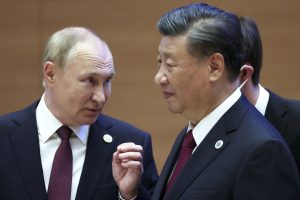U.S. officials and their counterparts in allied and partner countries increasingly view China’s position on the Russian war in Ukraine as a sign that Beijing has taken “Moscow’s side” and as evidence of a strong strategic partnership. However, events leading up to, and during, the recent Shanghai Cooperation Organization (SCO) meeting support arguments that the Sino-Russian relationship is limited in scope. Specifically, it is a relationship that is narrowly defined by a mutual interest in accelerating the emergence of a multipolar order that places limits on U.S. hegemony. Despite this convergence of interests, the two parties diverge on key aspects of this order. Furthermore, it is evident that Beijing and Moscow have sought to avoid making commitments to each other, which limits their capacity for cooperation, much less coordination on mutual interests. As a result, their bilateral relationship is best understood as a limited strategic partnership.
Russian President Vladimir Putin’s September 30 speech on the annexation of Donetsk, Luhansk, Zaporizhzhia, and Kherson referenced his aspirations for a multipolar order. This has not only been a core component of Russian foreign policy since the 1990s, but also the basis for Sino-Russian relations. This is evident from their “Joint Declaration on a Multipolar World and Establishing a New International Order” in 1997 as well as the founding charter of the SCO in 2002. Additionally, joint statements between the two countries have regularly referred to efforts to promote multipolarity over the past three decades.
From their perspective, multipolarity produces a more democratic, equitable, and stable international order. Importantly, Beijing and Moscow view each other as key poles in the multipolar order they promote. Despite this convergence of interest, their vision for this order is not entirely cohesive given China’s desire for Europe to have a prominent place in this order, albeit as an independent actor from the United States. This exposes a disconnect in their vision, since Russian has reservations about the European political, economic, and security architecture.
Furthermore, it is evident that although Chinese officials have sought to avoid condemning Russia for its aggression in Ukraine, the war has put Beijing in a difficult position given its professed support of sovereignty and territorial integrity. At the SCO meeting, Putin acknowledged Chinese concerns with Russia’s actions by stating, “We highly appreciate our Chinese friends’ balanced position in connection with the Ukraine crisis. We understand your questions and your concerns in this regard.”
Given the signaling by Chinese leader Xi Jinping leading up to the meeting, it is clear that Beijing seeks to limit similar Russian activities in areas proximate to China. On his way to the SCO meeting, Xi visited Kazakhstan on his first international trip since the COVID-19 pandemic began. In Astana, Xi pledged to “resolutely support Kazakhstan in protecting its independence, sovereignty and territorial integrity,” adding that he would oppose the interference of any force in Kazakhstan’s internal affairs. The statement not only served to continue promoting Beijing’s position as a champion of these norms, but also was a signal to Moscow, which has regularly questioned the legitimacy of Kazakhstan’s territorial sovereignty.
These divergences produce a strategic partnership predicated on promoting a multipolar order, which remains unrefined to account for their differences. However, that flexibility also results in a lack of deep commitments between the two countries outside of narrow areas like energy and defense procurement.
In international relations, state alignments can generally be measured against the level of commitments they undertake for another party. Sino-Russian agreements and interactions indicate that the two have avoided making deep commitments to each other. While all events are subject to change, no record in recent decades suggests either side is willing to incur costs for the other. This underlying principle has guided Sino-Russian relations, including during the war in Ukraine. The most explicit illustration of this is Beijing’s refusal to incur the cost of secondary sanctions by directly aiding Russia. Additionally, even tools that would bypass such sanctions such as an increased RMB denominated swap line or access to China’s Cross-Border Interbank Payment System have remained unused or underutilized due to concerns of financial exposure to Russia’s unstable economic situation. In fact, China has sought to turn the diplomatic environment into an opportunity, sometimes at Russia’s expense by extracting direct economic concessions or by politically exploiting the crisis.
This is the opposite of the West, whose biggest challenge before the war was the perceived lack of commitment within the NATO alliance. While today we see some of those concerns as less founded, what is important to notice is how elaborate and dedicated many NATO members (with some clear exceptions) were in conveying the importance of commitments. This commitment problem is persistent throughout international relations because countries can never be sure other countries will follow through on their promises. Therefore, this means countries must go to great lengths sharing resources, distributing burdens, and placing troops invited by allies, all to back up a commitment.
While avoiding deep commitments, China and Russia have historically incurred fewer costs in their bilateral relationship. This may advance autonomy but likely diminishes options when in greatest need. Policymakers should notice this attribute in Sino-Russian relations and develop tools that do not push China and Russia closer but instead exacerbate the inherent vulnerabilities that come from neither making a deep commitment to the other.
In the context of uncertainty around the Ukraine war, great power politics, nuclear proliferation, energy volatility, slowed economic growth, and waves of political populism, it is important to consider China and Russia taking a different path. However, in the war, Russia has inflicted and incurred exorbitant loss and costs conveying a commitment to its course of action. At this point Russia (and China) has not been interested in incurring significant costs to align with any other country.

































